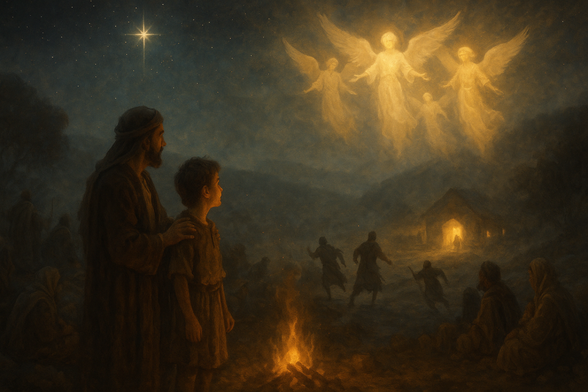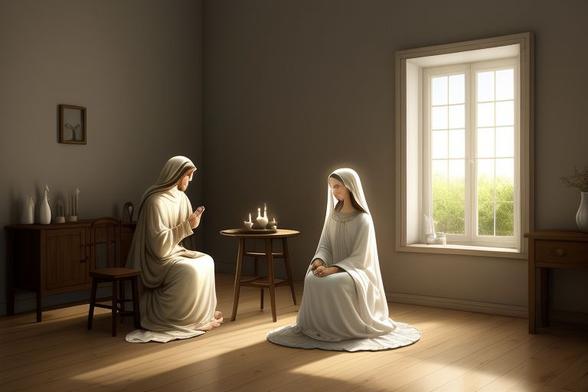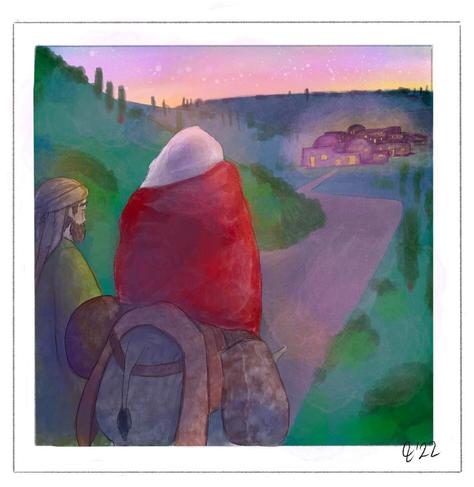When Fear Met Hope: The Birth That Changed the World
2,614 words, 14 minutes read time.
The church was quiet, the soft murmur of anticipation settling over the crowd. Pastor James stepped forward with a smile, his eyes reflecting the weight of the story to come. “Friends, tonight we have a special guest with us—Micah ben Jairus, a man who walked the dusty roads of Judea long ago and witnessed the birth of hope itself. Please welcome Micah as he shares with us a story that changed the world.” With that, Micah stood steady at the pulpit of Grace Harbor Community Church, his voice warm but heavy with memory.
Micah:
Good evening, friends. My name is Micah ben Jairus. I was born and raised in the hill country of Judea, not far from Bethlehem. I lived during a time of great change and uncertainty—a time when the mighty Roman Empire ruled over our land, and whispers of hope stirred quietly among the people.
You might ask why my words matter. I am no scholar or priest—just a simple man who lived through those times. I walked among the crowded streets and traveled with weary families. I witnessed the quiet beginnings of a story that would change the world. I listened to the shepherds’ whispers, felt the weight of kings’ footsteps, and saw the pain of a people living under the heavy hand of occupation.
It began with a decree from Caesar Augustus, the Roman emperor. A census was ordered—every man was to return to his ancestral home to be counted and taxed. My family lived near Hebron, but because my father’s family line traced back to Bethlehem, we had to make that long, difficult journey.
The roads were crowded with others like us—farmers, craftsmen, families—all moving south under the watchful eyes of Roman soldiers. The journey was harsh. Days of dust and sun, with little water and scarce food. Our feet were sore, and the weight of the trip pressed on us.
Among the many travelers, I saw a young couple moving carefully through the crowd. Joseph, a carpenter—strong and steady—walked beside Mary, who was heavy with child. They looked tired but determined, like they carried more than just their belongings. Even in the crowd’s chaos, there was something quiet and purposeful about them.
As a boy of ten, I wasn’t always paying close attention to the grown-ups’ worries. Along the way, I found company with other children traveling with their families. We played simple games to pass the long hours—chasing each other between the carts, trying to catch small lizards in the dust, or throwing stones into the dry riverbeds. Sometimes we told stories or sang songs from our villages, hoping to lift spirits as the days dragged on.
Still, the journey was hard, and the older ones often warned us to stay close. I remember stealing glances at Mary as she moved slowly, resting often. She seemed fragile, yet there was a calm strength about her. Joseph watched over her with gentle care, helping her when the road became too rough.
I didn’t know then that this young couple was carrying a secret the whole world would one day know.
When we finally reached Bethlehem, the town was bursting at the seams. Every inn was full—packed tight with travelers and families who had made the same journey for the census. There was no room for Mary and Joseph, no warm bed or quiet corner for Mary in her time of need.
My own family found no better luck. The city square was crowded with people setting up temporary shelters—small tents, makeshift lean-tos, and families gathered around fires, trying to find some comfort in the cold night air. We pitched our own tent in a patch of open ground just outside the bustle, near some rocky hills where shepherds sometimes took shelter.
Most nights, my father and I would walk out to the nearby caves—the same caves shepherds used to protect their flocks from the wind and wild animals. These caves were simple but dry, and sometimes we’d sleep there, under blankets woven by my mother’s hands.
It was hard. The air smelled of animals and earth, and the night was often pierced by the bleating of sheep and the calls of watchful shepherds.
Joseph and Mary found shelter in a stable—an open place where animals were kept safe. There, amidst the hay and the quiet breathing of animals, their child was born—Jesus.
I remember the stillness of that night, the soft sounds, and the heavy weight of hope resting quietly in a manger. The sky held a strange light that night—a star unlike any I had ever seen. But it was not the star I want you to remember first.
It’s remarkable to remember that the first to hear the news of Jesus’ birth were shepherds—poor men watching their flocks by night. In our time, we might picture shepherds as peaceful, almost poetic figures, but in those days, they were looked down upon. Considered unclean due to their constant contact with animals and their absence from temple rituals, they lived on the margins—often distrusted, rarely welcomed. Many believed they were thieves or drifters, fit for the fields but not for fellowship. It would be like today if the most important announcement imaginable was delivered not to scholars or officials, but to laborers with dirt under their nails and worn cloaks on their backs.
And yet, it was to them that heaven opened. One quiet night outside Bethlehem, the sky above these forgotten men erupted with light. A single angel appeared first, surrounded by glory too bright for words, and then came a multitude—singing, proclaiming the birth of a Savior in the city of David. “Peace on earth,” they said, “goodwill toward men.” And just as suddenly as they appeared, the sky went dark again.
The shepherds didn’t wait. They left their flocks—abandoning what little they had—and hurried into Bethlehem. I remember the square that night, filled with travelers and tents, merchants haggling over bread and shelter, children dozing on blankets, and the smell of smoke from campfires. Then came the shepherds, wide-eyed and breathless, pushing through the crowd, shouting that they had seen angels and that the Messiah had been born among us.
At first, people laughed. Some rolled their eyes. “Shepherds,” they said with a sneer. “What do they know of angels?” Others stopped to listen, unsure of what to make of it. I saw an older man clutch his walking staff and whisper a prayer beneath his breath. And the Pharisees, standing apart in their robes, crossed their arms and scoffed, muttering about blasphemy and improper witnesses. But even they looked uneasy. Because deep down, we all knew something had happened that night. The air felt different. The stars seemed too still.
The shepherds moved on, telling anyone who would listen. Their voices rang out in the narrow alleys and crowded corners of the town. They weren’t eloquent, but they were sincere—men lit by something beyond themselves. And though many dismissed them, the story took root, quiet and unstoppable, like light beneath a door.
Months later, wise men—Magi from the East—arrived, following that same star. They brought gifts worthy of a king: gold, frankincense, and myrrh.
But not everyone welcomed this new king.
Herod, the ruler appointed by Rome, was a man ruled by fear and ambition. He was known to be cunning and ruthless, a king who would stop at nothing to maintain his grip on power. Though he bore the title “King of the Jews,” many among the Jewish people did not truly see him as their rightful king. He was an outsider in their eyes—a man whose throne was held up by the might of Rome rather than by the favor of God or the people.
The people whispered stories of his cruelty, of how he had eliminated anyone who stood in his way—even members of his own family. There was a constant undercurrent of fear throughout the land, for Herod was known to be unpredictable and quick to anger. His grand building projects, like the great temple renovation in Jerusalem, impressed some, but to many, they were nothing more than attempts to legitimize his rule and mask the harshness beneath.
When the Magi came to Jerusalem asking about the newborn “King of the Jews,” Herod saw this not as news of hope, but as a direct threat to his throne. Paranoia gnawed at him—he could not allow a rival, even a child, to challenge his reign. Secretly, he summoned the wise men and demanded they find the child and report back to him. But the Magi, warned in a dream, did not return to Herod. Their silence sealed the fate of many innocent lives.
Furious and desperate to protect his power, Herod issued a brutal decree: every male child two years old and under in Bethlehem and its surrounding regions was to be killed. He wanted to be certain no rival king would rise, no matter how young or powerless.
Herod’s order unleashed a wave of terror in Bethlehem. Soldiers moved through Bethlehem under the cover of darkness, carrying out the slaughter with ruthless efficiency. They ripped baby boys from their mothers’ arms, whose desperate cries pierced the night air. Fathers who tried to protect their children were struck down without mercy, their bodies falling silently to the cold ground. Homes were broken into, and the terrified faces of families were etched forever in memory—faces frozen in horror, grief, and disbelief. The quiet streets were stained with sorrow, a terrible reminder of the cost of a king’s fear. The streets became silent except for the cries of grieving mothers and fathers. The pain was everywhere—hidden in whispered prayers, in the trembling hands of those who hid their children, and in the empty arms of those who lost theirs. Later, I heard rumors that similar horrors had touched other towns nearby, where soldiers acted with the same cruel orders, spreading fear like a dark shadow across the region. It was a confusing time. The good news of a Savior was wrapped in fear and sorrow. People struggled to believe that hope could come in the midst of such darkness.
Among the whispers, a story grew: Mary and Joseph, warned in a dream by an angel, had escaped. They slipped away from Bethlehem under the cover of night, fleeing to Egypt—a land far from Herod’s reach. It was a dangerous journey, but it was the only way to protect the child who would change everything.
That is how the King came into the world—not with trumpet blasts or royal banners, but in hardship and obscurity. He was cradled not in a palace, but in a stable, watched not by nobles, but by shepherds with calloused hands and broken sandals. He was born into a world aching with fear, into a night pierced by violence and uncertainty.
And yet… that night changed everything.
The birth of that child was not the end of the darkness, but the beginning of the light. It did not erase sorrow, but it gave sorrow a Savior. It did not silence fear, but it whispered courage into trembling hearts. Even as the cries of grieving mothers echoed through Bethlehem, even as Herod’s soldiers cast long shadows over the land, something new had begun—quietly, defiantly, eternally.
Hope had entered the world—not as an idea, but as a person.
And it was first proclaimed not in a temple or a throne room, but in an open field beneath the stars.
“Do not be afraid,” the angel said to the shepherds, as heaven split open above them. “I bring you good news of great joy that will be for all people. Today, in the city of David, a Savior has been born to you; He is Christ the Lord.” And then came the song of heaven: “Glory to God in the highest, and on earth peace, goodwill toward men.”
The heavens could not contain the news. The glory of God was not kept for kings, but poured out on the lowly. That declaration still echoes across time—not just as a memory, but as a promise.
I did not understand it all then. I was only a boy, clinging to my father’s hand in a world too heavy for a child to carry. But as the years passed and I heard more of that man—Jesus of Nazareth—I began to see what I had witnessed. The child in the manger grew to be the man on the cross, and the man on the cross rose to become the hope of the world.
Now, many years later, I still remember the sound of the shepherds’ voices, the look in Mary’s eyes, the hush of that strange night, and the brilliance of a star that seemed to watch us all.
And I know this:
The light that came into the world that night has never gone out. It shines still—in places of pain and in hearts that ache, in quiet acts of mercy, in every soul who chooses love over fear, peace over power, hope over despair.
That night in Bethlehem was not the end of the story. It was only the beginning.
Because the Light has come—and the darkness has not overcome it.
Author’s Note
The story you just read is a work of fiction—Micah ben Jairus is not a historical figure, but a narrative lens through which we might glimpse the wonder, struggle, and hope surrounding the birth of Jesus. While the characters and dialogue are imagined, the events are based on the true story found in the Gospels of Matthew and Luke.
The birth of Christ was not a quiet tale meant only for a distant time. It was the beginning of a world-altering truth: that God stepped into history—not as a conqueror, but as a child; not with power, but with peace. In the most unlikely place, through the most unlikely people, hope was born into a dark and hurting world.
That hope is not bound to Bethlehem. It continues today—in the broken places, in silent prayers, in acts of mercy, and in every heart that still longs for light in the darkness.
If this story moved you, challenged you, or gave you something to think about, I’d love to hear from you. Feel free to leave a comment or share it with someone who might be encouraged by it.
And if you’d like to follow along for more reflections, stories, and reminders of grace—you’re warmly invited to do so.
Thank you for reading.
D. Bryan King
Sources
Disclaimer:
The views and opinions expressed in this post are solely those of the author. The information provided is based on personal research, experience, and understanding of the subject matter at the time of writing. Readers should consult relevant experts or authorities for specific guidance related to their unique situations.
Related Posts
#angelProclamation #Bethlehem #BibleChristmasStory #biblicalCharacters #biblicalFiction #biblicalHistoricalFiction #birthOfJesus #childOfPromise #ChristianAuthor #ChristianCreativeWriting #ChristianEncouragement #ChristianFictionPost #ChristianHope #ChristianStorytelling #ChristmasDevotion #ChristmasLight #ChristmasReading #ChristmasReflection #ChristmasStory #ChristmasStorytelling #EgyptEscape #faithAndHope #faithInHardship #faithJourney #faithOverFear #fictionalChristmas #goodwillToMen #GospelInspiration #GospelNarrative #HerodTheGreat #historicalNativity #holidayReflection #hopeWasBorn #inspirationalChristmas #JesusBirthRetelling #JesusInTheManger #JesusMessiah #JewishHistory #lightInDarkness #Luke2 #MagiVisit #mangerStory #MaryAndJoseph #Matthew2 #MicahBenJairus #nativityRetelling #nativityStory #overcomingDarkness #peaceOnEarth #retellingOfJesusBirth #RomanCensus #sacredChristmas #shepherdsAndAngels #shepherdsInBible #spiritualStory #StarOfBethlehem #storyOfJesus #storytellingMinistry #wiseMenGifts


